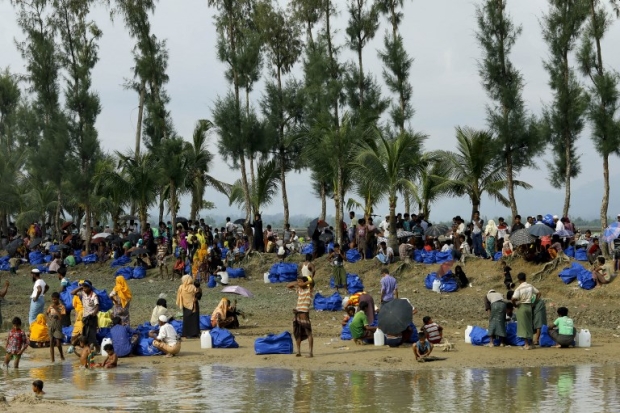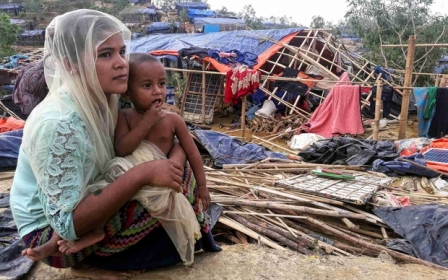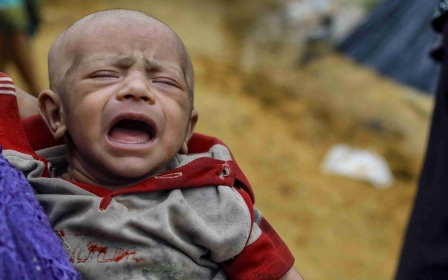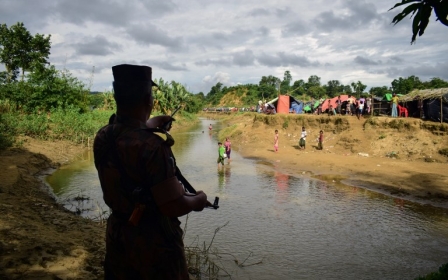Ethnic cleansing of the Rohingyas: Israel exports its war on indigenous people once again
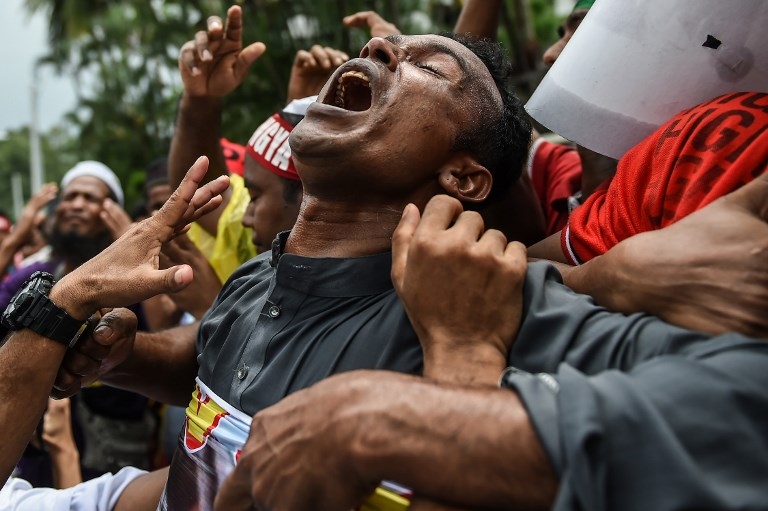
It shouldn’t surprise anyone that there is an Israeli connection to the current violence and genocidal policies of the Burmese junta against indigenous Rohingyas.
Not only did Israel aid and abet the regimes behind the Rwandan and Sebrenica genocides, but it has also supported various governments around the world as they have oppressed their own indigenous people.
Weapons used against the Palestinians are being sold as ‘field-tested’ weapons to some of the worst regimes on the planet
- Ofer Neiman
Myanmar is only the latest recipient of Israeli weapons and training, a double export that has enabled the regime to carry out policies of ethnic cleansing like those Israel inflicted on Palestinians. As Israeli human rights activist Ofer Neiman told Middle East Eye, the policies aren’t just similar: there is a clear cause and effect.
“Successive Israeli governments have been selling arms to the military dictatorship in Burma for years. This policy is strongly related to Israel’s oppression and dispossession of the Palestinian people,” he said.
“Weapons used against the Palestinians are being sold as ‘field-tested’ weapons to some of the worst regimes on the planet.”
Activists have launched a campaign to urge the Israeli government to stop the arms exports to Myanmar which the Israeli High Court is scheduled to hear this month.
But the results are likely to be the same as rulings on the Rwandan and Sebrenica genocides in which the Israeli court argued that the matters should be kept secret in the interests of national security.
Victims as victimisers
When Israel portrays itself to the world as a victimised nation restoring a safe haven for the Jewish people, it obscures the truth of how it came to be: Israel was created with and continues to use the same tactics that the Burmese government is using against the Rohingya.
The state of Israel was formed through three Jewish militant organisations - the Irgun, Hagan and Lehi. These foreign and colonial paramilitary forces committed policies of ethnic cleansing, massacres and uprooting of homes and burning of lands inhabited by the local indigenous population, the Palestinians. Eventually, these groups were absorbed into what is known today as the Israel Defence Forces.
As in the case of the Palestinians, the victims are deemed the victimisers, and the victimisers as the victims
Like the Palestinians, the Rohingyas have been rendered stateless and under threat or denial of citizenship. They are permanent refugees with no entity or neighbouring country officially willing to take them in with full respect and protection of their rights. Like the Palestinians, they are in permanent stagnation status and exist in a legal vacuum.
As in the case of the Palestinians, the victims are deemed the victimisers, and the victimisers as the victims, as both Israel and the Burmese military government accuse the indigenous inhabitants who are being massacred and subjected to permanent genocidal policy of terrorist activity.
The Burmese government’s attempts to relocate the Rohingyas has been extremely problematic, resembling Israel’s policy of population transfer to deal with a “solution” to the indigenous Palestinian inhabitants of the historic land of Palestine.
In the same way some political and religious leaders in Israel have used rabbinical justifications for murder, rape and sexual violence, genocide and ethnic cleansing of Palestinians, some Buddhist political and religious leaders are doing the same and driving the violence against the indigenous Rohingyas.
Impotent response
While the Palestinian resistance movement Hamas has denounced the violence of the Burmese military regime against the indigenous Rohingyas, the response of the international community is not surprising.
The impotence of the international community to take action beyond condemnations and declarations that the situation is a threat to international peace and security is appalling.
The Palestinians, like the Rohingyas, are being subjected to a policy of ethnic cleansing and violence enabled through the impotence of international law
So is the lack of serious or immediate measures taken by the United Nations Security Council against the Burmese junta through sanctions or military intervention, demonstrating just how futile international law is in this crisis.
This has been the same for the Palestinians as they go through the ongoing Nakba, which some argue started in 1799, but which was executed in 1948 and exacerbated in 1967 to the present day.
The Palestinians, like the Rohingyas, are being subjected to a policy of ethnic cleansing and violence enabled through the impotence of international law, something recognised by Desmond Tutu, who has also spoken out against Israeli oppression of the Palestinians.
Myanmar's 'Nakba'
There are two options going forward for the Rohingyas. Either the situation will continue to be ignored and a serious and ongoing catastrophe or "Nakba" will be permanently and systematically imposed on the Rohingyas.
Or the world will respond appropriately and in accordance with the principles of international human rights law and hold the Myanmar junta accountable.
Could the way we react to Myanmar set a new precedent for the Palestinian people? Only time will tell.
- Ahmad Moussa is a human rights scholar and activist and a regular contributor and freelance writer to various international news agencies. He is a scholar of indigenous and Middle Eastern issues. He is also a human rights activist with a Master of Arts in International Law and Human Rights. Moussa is currently involved in research for a doctoral degree in War Studies.
The views expressed in this article belong to the author and do not necessarily reflect the editorial policy of Middle East Eye.
Photo: Rohingya refugees living in Malaysia shout slogans during a protest against the treatment of Rohingya Muslims in Myanmar, in Kuala Lumpur on 8 September 2017 (AFP)
This article is available in French on Middle East Eye French edition.
Middle East Eye propose une couverture et une analyse indépendantes et incomparables du Moyen-Orient, de l’Afrique du Nord et d’autres régions du monde. Pour en savoir plus sur la reprise de ce contenu et les frais qui s’appliquent, veuillez remplir ce formulaire [en anglais]. Pour en savoir plus sur MEE, cliquez ici [en anglais].



